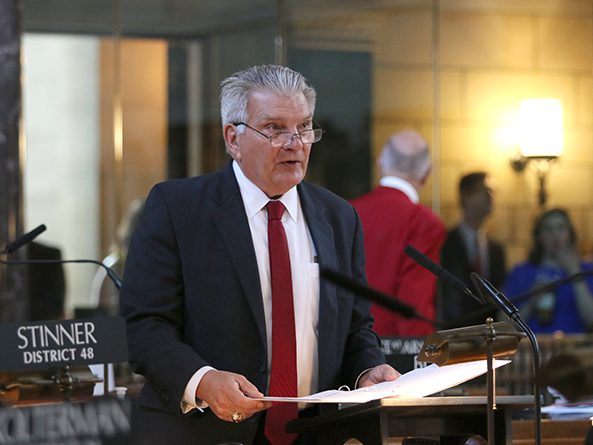Portions of state budget advance, cloture motion on mainline budget bill fails
Lawmakers gave second-round approval May 14 to seven bills included in the state’s $9.3 billion budget package. The mainline budget bill remains on select file.
The state budget is structured on a two-year basis, with the budget enacted during legislative sessions held in odd-numbered years.
LB294, introduced by Speaker Jim Scheer of Norfolk at the request of the governor, is the mainline budget bill and would fund state government for the next two fiscal years. Debate centered on an amendment brought by Lincoln Sen. Kate Bolz, vice chairperson of the Appropriations Committee.
The Bolz amendment would make a number of technical changes to the bill and would add $4 million in general funds to the Nebraska secretary of state’s office to replace Americans with Disabilities compliant voting equipment.
The amendment also would incorporate provisions of Bolz’s LB181, which she said were inadvertently left out of the committee amendment adopted during general file debate.
The provisions would use $87,500 from the Nebraska Nursing Facility Penalty Cash Fund to pay for a study to examine demographic trends, project current and future service needs and provide recommendations for continued statewide access to long-term care services, including nursing facility care, for Medicaid recipients.
Bolz said 33 skilled nursing and long-term care facilities closed between 2015 and 2018 in Nebraska and an additional 33 were placed under receivership in 2018.
“I think we need to be thoughtful and strategic in how we’re supporting our nursing facilities as our population ages,” she said.
Omaha Sen. Sara Howard, chairperson of the Health and Human Services Committee, supported the amendment. She said it’s important to examine the state’s long-term care situation both from an administrative perspective and from the perspective of demographic and workforce challenges.
“There is a discrete difference between the two,” she said.
Sen. Matt Williams of Gothenburg also supported the amendment, saying all of the long-term care facilities in his district are “hanging on by a thread.” He said the recent closing of two facilities is indicative of a “perfect storm” in rural Nebraska of an aging population coupled with a lack of health care providers.
“I got to see firsthand what it looks like when people don’t get paid, yet they still have people to take care of,” Williams said.
Elmwood Sen. Robert Clements opposed the portion of the amendment containing provisions of LB181, which he filed an amendment to strike. He said the state Department of Health and Human Services indicated during a public hearing that the study was not necessary.
Sen. Andrew La Grone of Gretna spoke in support of other portions of the amendment, specifically those that would provide funding for ADA compliant voting machines.
“We have an election technology crisis in this state,” La Grone said, noting that Nebraska’s current 17-year-old election technology has a 10-year expected life span. In addition, he said, allowing the secretary of state to purchase the expensive machines in bulk would result in cost savings.
After extended debate, Gering Sen. John Stinner, chairperson of the Appropriations Committee, offered a motion to invoke cloture. A successful cloture motion ends debate and forces a vote on the bill and any pending amendments. The motion failed on a vote of 31-14. Thirty-three votes were needed.
LB294 is scheduled for further debate May 15.
Other provisions
Omaha Sen. Robert Hilkemann offered an amendment to LB298, a bill in the budget package that would repeal and create funds and make certain fund transfers.
The amendment would require each county treasurer to determine the percentage of property tax credits that are provided to Nebraska residents, or organizations that are located in Nebraska, and the percentage of credits that are paid to nonresidents.
Hilkemann said that possibly as much as 40 percent of payments from the state’s Property Tax Credit Cash Fund may go to nonresidents of Nebraska, but that the information currently isn’t compiled.
“It’s about transparency, folks; let’s find out,” he said. “Maybe this will open up new ideas for us, but we won’t know what we don’t know until we ask the question.”
A report based on ZIP code data would be made to the Legislature and the state Department of Revenue by Dec. 31, 2020.
The amendment was adopted on a 25-17 vote.
Sen. Mike Moser of Columbus then offered an amendment that would strike the Hilkemann amendment from the bill.
Moser said tax information could be mailed to attorneys—or only one family member if property is owned jointly—so that ZIP codes associated with tax statements likely would not be an accurate representation of the desired information.
In addition, he said, no plan is in place for what to do with the information gathered.
The Moser amendment was adopted 25-14 and LB298 was advanced to final reading by voice vote.
Also advanced to final reading on a voice vote were:
LB295, which would provide for the $12,000 annual salaries of Nebraska’s 49 state senators;
LB296, which would fund salaries and benefits for judges and constitutional officers;
LB297, which would appropriate funds for reaffirmed and new capital construction projects;
LB299, which would make a $54.7 million transfer from the state’s Cash Reserve Fund to the Nebraska Capital Construction Fund to cover costs for two additional high security housing units—384 beds—for the Department of Correctional Services; and
LB464, which would provide for payment of claims against the state.
Finally, LB293, which would adjust appropriations for the current fiscal year, was advanced on a 45-1 vote following a successful cloture motion.


